'Attractive for an Asian man’: Photographer reframes Asian American masculinity
Chinese American photographer Andrew Kung is reclaiming representation of the all-American man, one portrait at a time.
Throughout his life, Andrew Kung has been told that he’s attractive — for an Asian man.
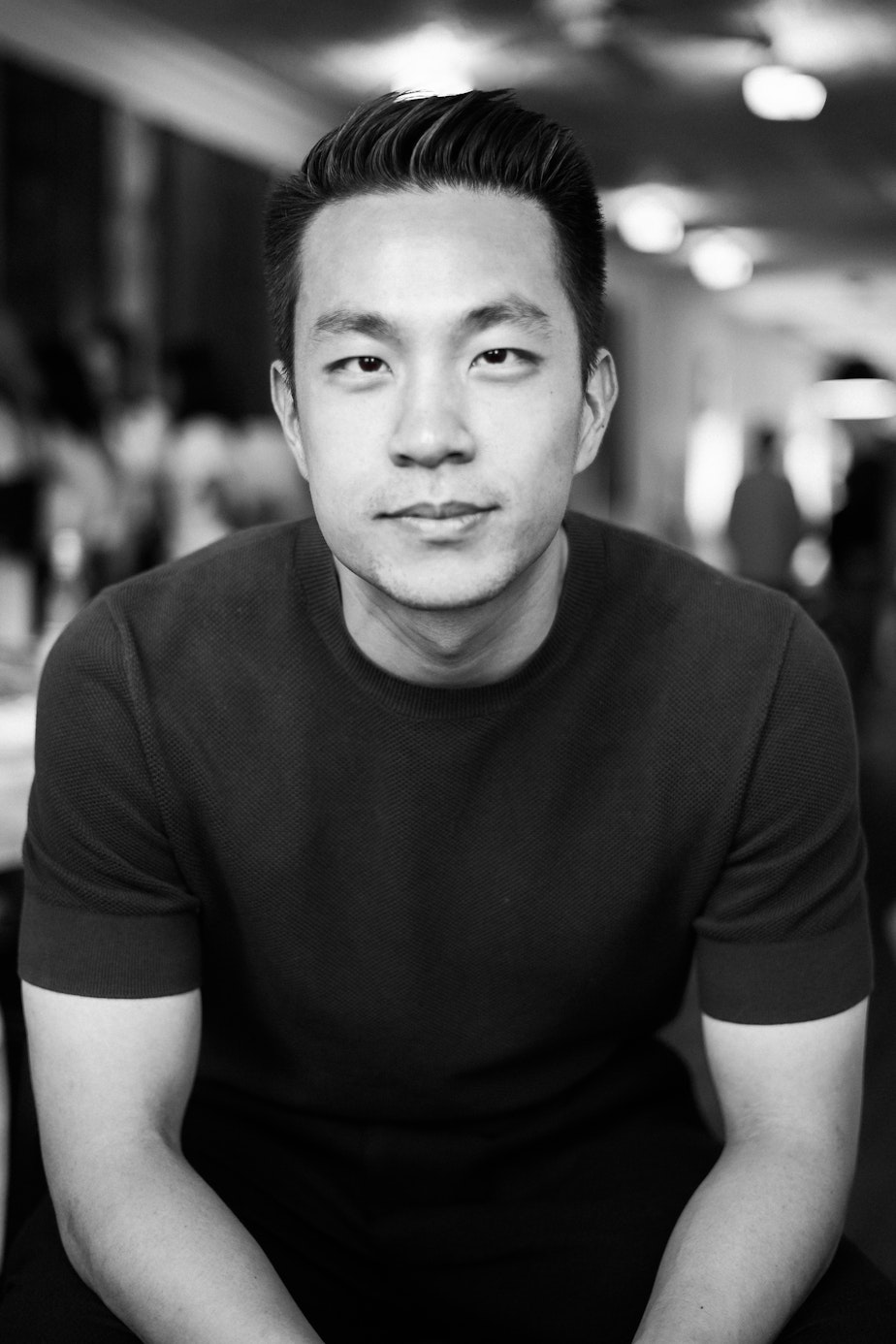
“Why can't I just be attractive on, like, an absolute spectrum,” Kung recalls thinking to himself after receiving the familiar backhanded compliment once again. “Why does it have to be because I'm an Asian man? Does that imply that we are emasculated, passive, weak, unattractive?”
Fed up with microaggressions and the lack of nuanced representation of Asians in the media, Kung left his tech job in Silicon Valley, picked up his camera, and moved to Brooklyn, New York.
For the past five years, Kung has been reframing Asian American identity through portrait photography.
Sponsored
In this special segment for KUOW’s On Asian America collaboration, Seattle Story Project writer Simon Tran interviews Kung about The All-American, Kung’s portrait series that aims to subvert stereotypes that portray Asian men as powerless and desexualized.
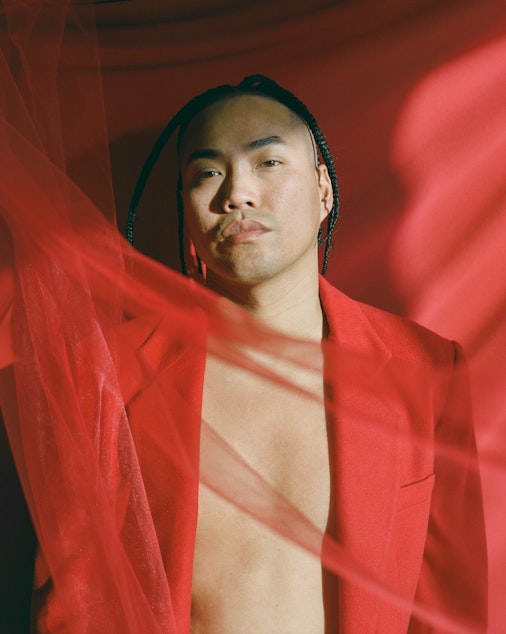
On Asian America is a collaboration between Humanities Washington, KUOW Public Radio, Spokane Public Radio, and Northwest Public Broadcasting. The goal of the series is to amplify Asian voices and spark an ongoing dialogue about the experiences and contributions of Asian communities in our state and in our country.
A special On Asian America broadcast featuring an in-depth conversation about this interview between Andrew Kung and Simon Tran will stream live at KUOW.org and air on KUOW 94.9 FM on Tuesday, June 15, 2021 at 1 p.m. PST / 4 p.m. EST. This program will also be featured on KUOW's YouTube channel with live interactive engagement on Thursday, June 17, 2021 at 6 p.m. PST / 9 p.m. EST. Learn more and RSVP here.
The transcript below has been lightly edited for clarity.
Sponsored
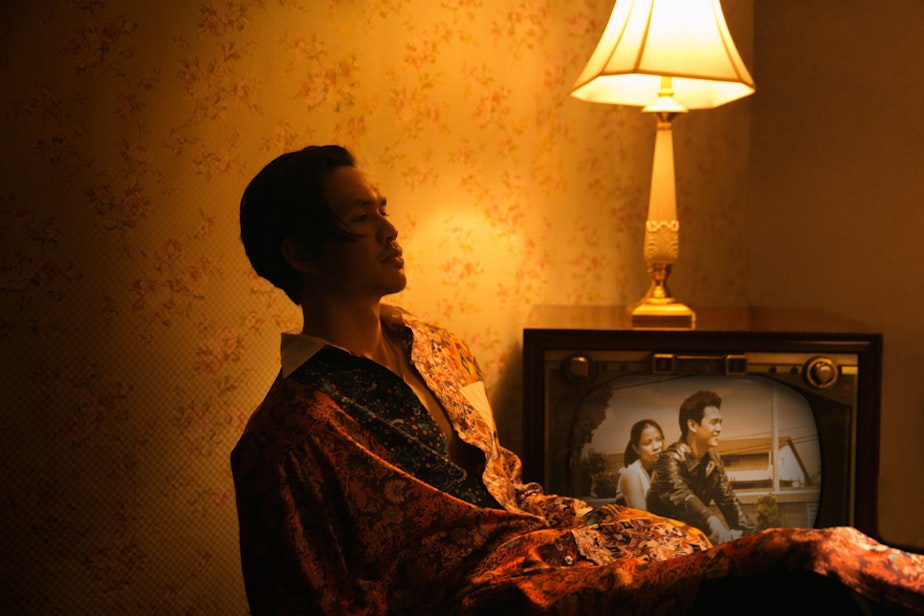
TRAN: Hi, my name is Simon Tran. I'm a storyteller, actor, and cultural producer based in Chicago, Illinois. I studied drama and the comparative history of ideas at the University of Washington.
KUNG: My name is Andrew Kung. I'm a photographer based in Brooklyn, New York. I grew up in the beautiful city of San Francisco, went to business school at UC Berkeley, worked in Silicon Valley at LinkedIn before realizing that I didn't want to be in that space. So I moved out here to New York, and since then have been pursuing photography for the past five years.
TRAN: Andrew, it's so great to meet you.
KUNG: So nice to meet you as well, Simon.
Sponsored
TRAN: So you had mentioned you know, a little bit about the All-American series. Could you describe to me a little bit more about the series?
KUNG: It is an exploration of what it means to be American, and what it means to be masculine in the context of the desexualized Asian American man.

Sponsored
I did a lot of investigating of my own kind of experiences growing up, and some of the microaggressions that I faced, and a lot of the aggressions that some of my friends and peers had faced, as Asian Americans and also as Asian American men specifically.
And so that's when I started really hashing out like, what are some of the scenes that I wanted to capture from the classroom, or from the locker room where you had these images of white women in the lockers and they were the form of beauty.
And that made me question, why is it that we didn't celebrate APAHM [Asian Pacific American Heritage Month] in May? Or why is it that, you know, Asian men were idolizing white women as a form of beauty?
I was challenging a lot of these notions that I think that I had, and a lot of other Asian American men or boys had growing up,
TRAN: You had mentioned that you grew up in the Bay Area, San Francisco. I grew up in Olympia. You know, the Bay Area is known for having a really strong connection and community of Asian Americans. But when you went down to the south, to Mississippi, what were some things that you experienced, and saw that you can't really experience where you grew up?
Sponsored
KUNG: I think one of the first feelings was just landing in Mississippi and just having everybody stare at you. I really, for the first time, truly felt like a perpetual foreigner, or like an outsider that really just did not belong.
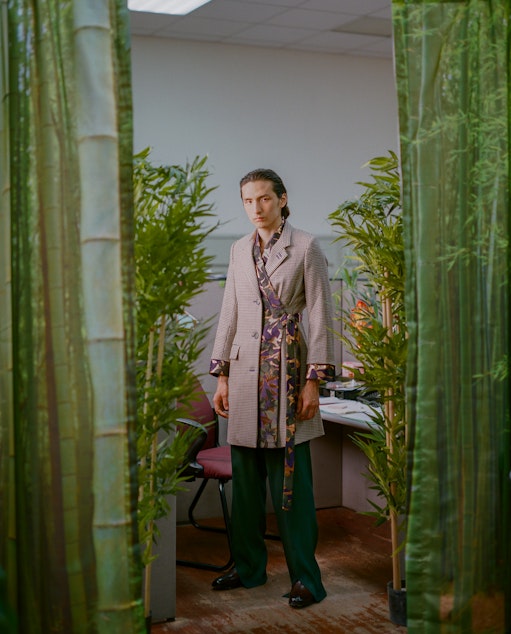
Sponsored
And it wasn't until I met the members of the Chinese Delta community that I started feeling a bit more kind of kinship, and kind of community.
Because I think for them, they had to immigrate to the US and grow up in those type of environments, and the only people that they had were each other. So they would find community in grocery stores or in potlucks they'd have every weekend. So I think seeing a lot of that reminds me a lot of my own family and a lot of the greater Asian American community.
TRAN: You had mentioned the physical spaces — the locker room, the classroom.
I can think of a specific moment in the classroom of one of these microaggressions that you had mentioned. It was in health class, and we had to draw the human body. And because I was the smallest, they traced me, because it was easier on the construction paper. And they like, you know, had to draw anatomy. And they made like, this was in seventh grade ...
KUNG: Wow.
TRAN: And they made those, you know, comments and questions. I was curious, if, especially being an Asian man, is there a moment that you had of being "othered?" In that physical sense?
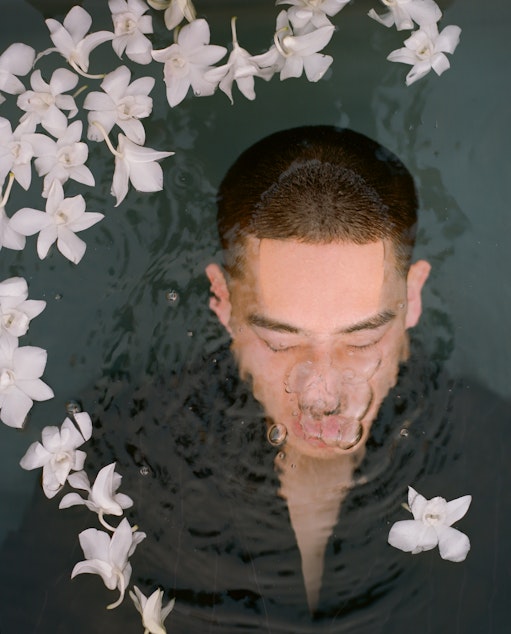
KUNG: Yeah, I think for you is that moment where you're kind of being traced and being almost used as a subject because of, you know, your size or whatnot.
And I think, for me, that experience, wow, there were many experiences like that. I think one of the first ones that come to my head is that I think even at an early age I would hear comments like, "Oh, yeah, you're really attractive for an Asian guy."
Now, I was like, wow. You know? Why can't I just be attractive on like an absolute spectrum? Why does it have to be because I'm an Asian man? Does that imply that we are emasculated, passive, weak, unattractive? You know, is that the norm in the context in why you made that statement? And I think I would hear that a lot growing up and even to this day,
TRAN: Totally. You know, through your portraits, you really showed that. And you chose three photos that stood out to you. Can you talk to us more about these portraits and why these ones stood out to you?
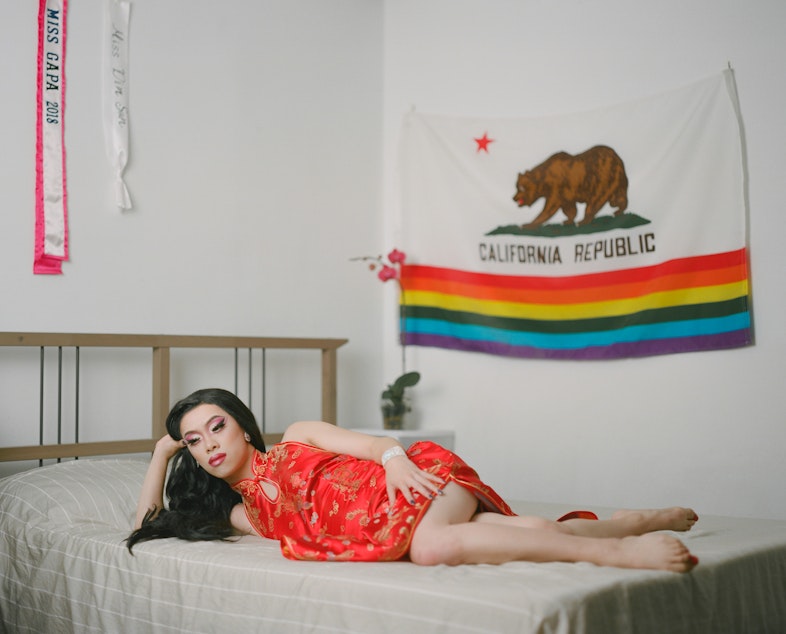
KUNG: We can start with the two images, the black and white and the color of Jeffrey.
I was setting up in Jeffrey's bedroom, and I was like, 'Oh, I want to make this a very narrative image.' And so I was asking him about his experience as a drag artist in LA. And he told me that it's a very interesting intersection between themes of gender identity and race.
Because as a drag artist, Jeffrey had experienced both the de-sexualization of an Asian American man, when he was just walking down the street without his drag attire or his performance attire. And the moment he would be on stage as a drag artist, he would be fetishized by, you know, a bunch of white men who started cat-calling him on stage and made really condescending and disturbing comments while he was on stage.
So Jeffrey had to experience both what it means to be de-sexualized, and also what it means to be fetishized as an Asian American woman.
And so when you look at the two images, you really see a polarizing difference between the different experiences that Jeffrey has to face as a drag artist, and also as an Asian American man.
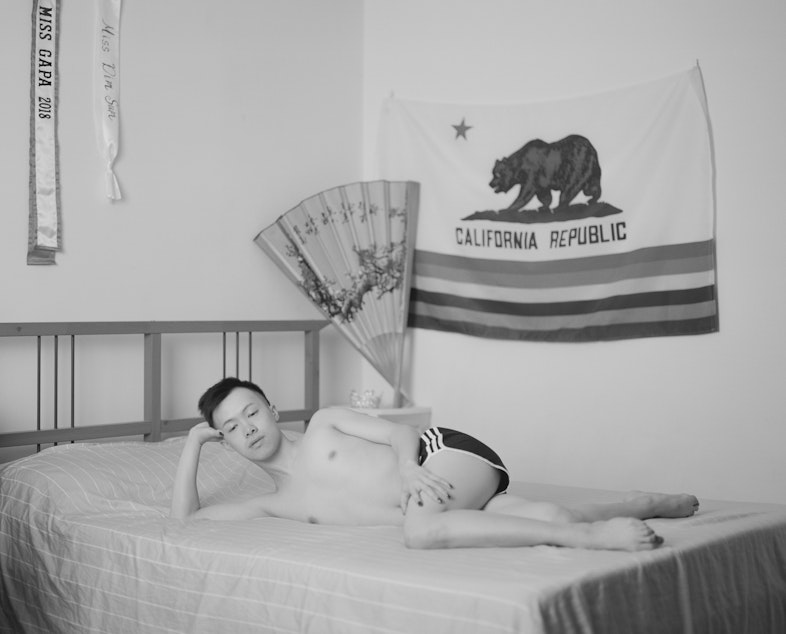
TRAN: Yeah, just adding to that, you know, I was really curious to hear you talk more about intimacy, because that is a theme that you really focused on for the All-American project.
It's interesting, because as Asian American men, we're not expected to talk about our feelings. Our cultures don't allow us to be vulnerable or intimate with each other or ourselves.
So what does intimacy mean in relation to this project? But then also, why did you want to include it?
KUNG: Great question. I think intimacy has been such a large taboo in Asian culture. You know, how we're not brought up to say words of affirmation or affection, like "I love you," or to have physical touch or hugs with our parents or family members.
I think intimacy is a theme that's really interesting to me and I really wanted to bring that across in the images. Because in Asian culture, we're not used to seeing that or feeling that. And it doesn't even have to be two people embracing each other. But it could be even just intimacy with yourself and comfort with yourself.
We're so used to kind of defining masculinity as something that is, you know, a chiseled jaw line, a really built kind of structure, a certain type of persona, or personality, and what it means to be "all-American."
And so I think, for me, a big part was turning that whole idea on its head and saying that masculinity could be intimate, it could be soft, it could be a range of spectrum of experiences like that of Jeffrey.
And so that intimacy piece, and especially how I photograph that, was a really big part of turning that idea of masculinity on its head.
TRAN: I love that. And as an actor, that really resonates with me, because I think that we're expected to go certain routes that are kind of already created for us that are very, as you said, very--they're not on the spectrum. They're not nuanced.
And I actually just finished the book Interior Chinatown. I don't know if you've read it?
KUNG: Yeah, yeah. And I haven't yet. It's on my list.
TRAN: But you know, they have characters called, you know, "the kung fu man," right. He's trying to make it to that pinnacle kind of level. But then you realize that you're still reaching and you know, hitting the "bamboo ceiling," because it's still not enough. And it's still not what really represents us.
I'm curious to hear more about the other conversations that you had with other Asian American men in this project. What was a common theme that you heard when you were talking to folks that you that you photographed?
KUNG: So before every shoot, I would really be intentional about asking and telling them, "Hey, this is the narrative that I'm thinking about, for this particular image. How does that feel or resonate with you?"
And I think oftentimes the theme that would be centered around their narratives with just this feeling of being invisible. This feeling of being overlooked, and also feeling not desired and desexualized by mainstream media, by mainstream media representations, and oftentimes by the microaggressions that they faced growing up, and even today.
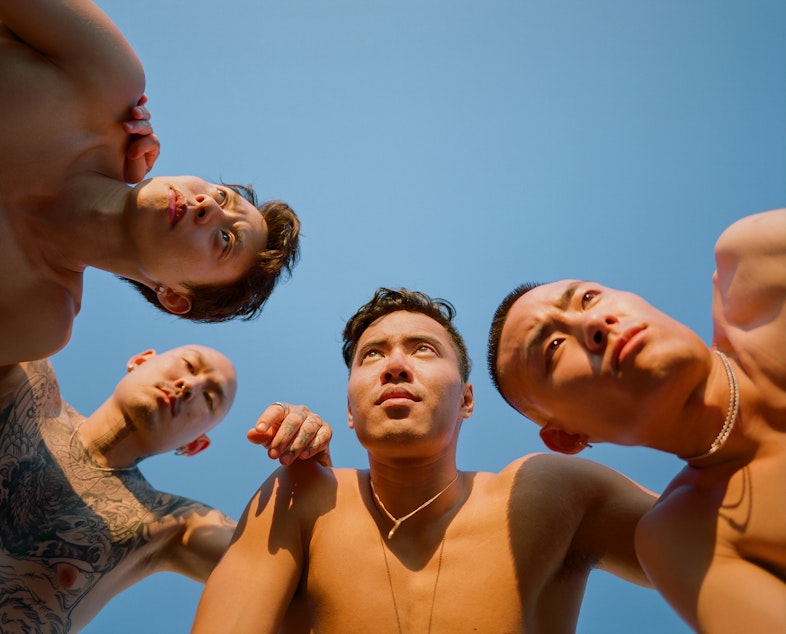
So I think those are the central themes that came up no matter what the environment was. From, you know, the classroom to the lockers to the bedroom, these were all consistent themes that a lot of the subjects would talk about.
And I think it gives me a lot of kind of satisfaction knowing that it isn't just my narrative, or it isn't just a couple of people's narratives, but it really is a larger narrative that talks about some of the themes that the Asian American community has to face, and specifically Asian American men.
TRAN: And I'm going to do one more question, and I think we'll wrap up. In what ways has doing this series impacted the way you see yourself?
KUNG: Yeah. That's a really good question. So I think after doing this series, I was exposed to so many narratives and so many experiences from Asian American men who grew up in the Bay Area, to middle America, to the east coast, ranging across the gender sexuality spectrum. It really exposed me to the different experiences that Asian American men have.
And for me, it made me more curious to explore even more nuanced narratives. And so I think the series really pushes me, and continues to push me, to expose myself to different communities, different individuals, and different experiences.
Because me as an Asian American man myself, I have my own singular experience, but there's so many other experiences out there to learn and to incorporate into my work. And I think as an artist, I have a responsibility to do that as well.
So I'm not just telling, you know, my own story, but being able to accurately represents a broader spectrum of what it means to be Asian American and what it means to be an Asian American man.
TRAN: Well, thank you so much, Andrew, for talking with me today. It was an honor to learn about this series, but also just to talk with you.
KUNG: Yeah, thank you, Simon. I really appreciate it. And I'm glad that you're also in the creative space with acting and producing and whatnot. So we'll definitely have to link up at some point.
TRAN: Absolutely.
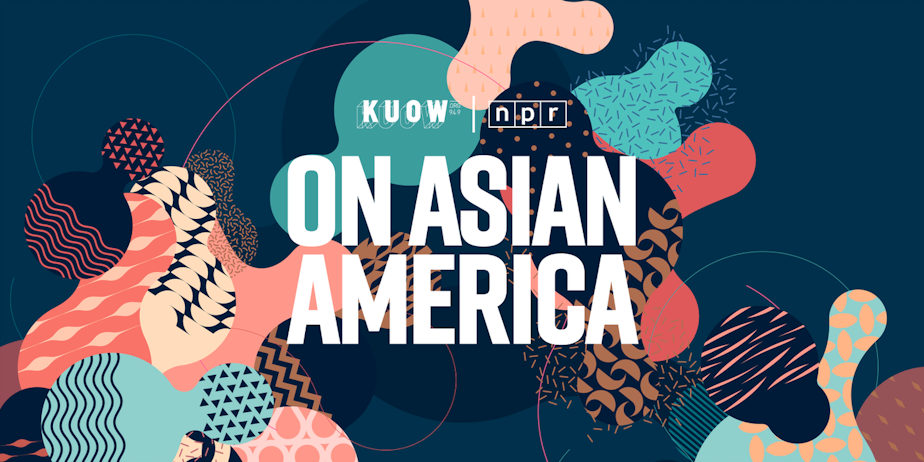
Producer's note: Identity is a complex topic, and I welcome your feedback. You can email me at kleong@kuow.org and find me on Twitter @kristinleong. I also welcome your ideas for stories from our Asian communities that KUOW should look into next. Reach out. We're listening.
You can also submit feedback and questions about this story by emailing engage@kuow.org, leaving a voicemail at 206-221-1926, or texting the word “feedback” to 206-926-9955 to send a text.




